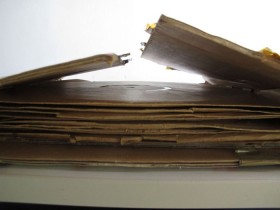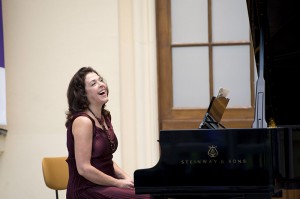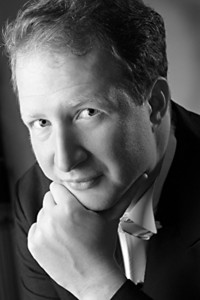The last few weeks have been full of hectic hustle and bustle, with boxes being passed from hand to hand, examined, unpacked, and sorted through. Such a variety of objects emerged from their cases and seemed to be disseminating in every direction through the museum.

© Jewish Museum Berlin, photo: Gelia Eisert
Blue prints were spread out over a long, dark red sheet. Words seemed to glow in them – was it “tekhelet” or “argaman” or both? And what do they mean anyway?

© Jewish Museum Berlin, photo: Gelia Eisert
A “magic” card appeared in a kitchenette. Suddenly everything was kosher: the sink, the refrigerator, the dishes, the whole kitchen. The artist promised it would be, and thus it happened. → continue reading
There are films slumbering in an archive somewhere, waiting to be discovered. And there are films that have sunk into oblivion but then suddenly pop up again, in the form of a soundtrack.

The schellac records, as found © Jewish Museum Berlin, Photo: Regina Wellen
Recently, when stock was being moved to another depot, our colleague Regina Wellen looked over the collection of 78rpm schellac records with a view to devising a new way of storing them. She thereby came across eleven not yet inventoried records, much larger than the usual sort and with a label suggestive of some other purpose than easy listening on the home gramophone. Luckily for us, Regina was quickly able to establish that these were examples of the sound-on-disc recordings played in cinemas as an accompaniment to screenings of otherwise silent films—synchronously, thanks to the built-in start signal. One of the twenty numbered boxes on each label used to be checked after each screening, so as to ensure that a worn-out record would be replaced in good time. After Regina had dry-cleaned the records and prepared → continue reading
An Interview with Elena Bashkirova
From 7 to 11 May, we will host a chamber music festival in the museum’s Glass Courtyard. Katharina Schmidt-Narischkin and Sylvia Winkler of our press office spoke in advance with the festival’s director Elena Bashkirova.
Press office JMB: As festival director, what themes have you chosen to emphasize this year?

Elena Bashkirova, festival director and pianist
© Monika Rittershaus
Elena Bashkirova: Our themes have been determined this year by two anniversaries: on the one hand, the start of the First World War 100 years ago and its impact on music; on the other hand, the 150th birthday of Richard Strauss. Both anniversaries augur a varied program for “intonations”: 1914 saw an astonishing richness of musical styles, which our concerts will reflect. And Strauss composed chamber music nearly his entire life, so I have a wide range of pieces and genres to choose from.
Every year at “intonations,” chamber music classics can be heard together with unknown works. What composers should visitors expect to discover in this third season?

David Robert Coleman, composer and conductor © private
Rudi Stephan was an extraordinary discovery for me. I heard Music for Orchestra and Violin a few years ago here in Berlin. I was impressed and deeply touched by it. As I was putting together the programs for “intonations,” I found his gorgeous chamber music and was delighted to have the chance to present it here with my colleagues. Rudi Stephan died in the war when he was 28. Given his talent, he would otherwise have certainly provided us with more outstanding music.
There will also be another world premiere: the fourth concert, on Saturday 10 May, will open with David Coleman’s “Three pieces for clarinet and piano.” Another significant composer this year will be Karol Szymanowski. He has his own tonal language, writing hauntingly beautiful music that unfortunately is played much too seldom. → continue reading




